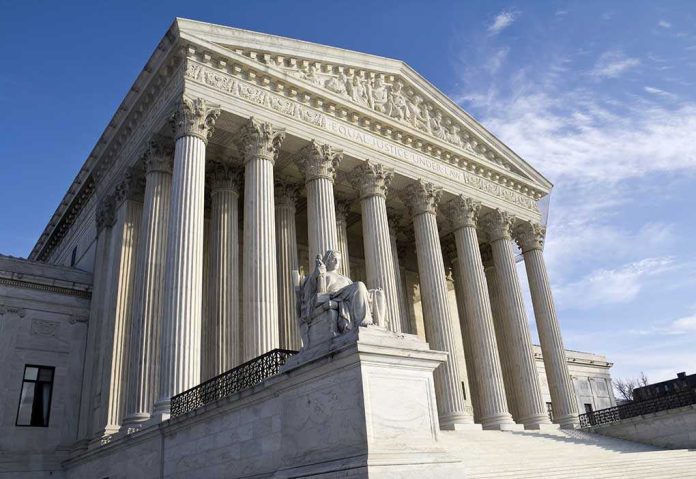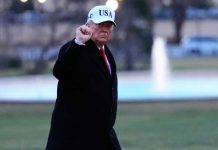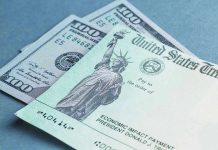
The Supreme Court faces a trillion-dollar constitutional showdown that could either vindicate President Trump’s bold executive authority or hand globalist critics their biggest victory yet in dismantling America-first trade policies.
Story Snapshot
- Supreme Court will decide if Trump can impose sweeping tariffs under emergency powers, bypassing Congress
- Lower courts ruled against Trump’s tariff authority, potentially costing government $1 trillion in refunds
- Case represents landmark test of presidential power versus congressional control over trade policy
- Oral arguments scheduled for November 5, 2025, with precedent-setting implications for future presidents
Constitutional Crisis Over Trade Authority
President Trump’s sweeping global tariffs face their ultimate test as the Supreme Court prepares to determine whether executive emergency powers can override Congress’s traditional authority over trade policy. The case centers on Trump’s use of the International Emergency Economic Powers Act (IEEPA) to impose tariffs ranging from 10% to 50% on imports from Canada, China, Mexico, and numerous other countries. Lower federal courts have ruled against the administration, creating a constitutional crisis that threatens to undermine America’s negotiating position with hostile foreign powers while potentially costing taxpayers up to $1 trillion in refunds.
Defending Presidential Emergency Powers
The Trump administration argues that IEEPA grants necessary authority to protect national security and combat drug trafficking from Mexico and fentanyl imports from China. Solicitor General D. John Sauer filed a 49-page brief defending the tariffs as essential tools for promoting peace and prosperity while maintaining America’s economic leverage. The administration contends that national emergencies require swift executive action that cannot wait for congressional deliberation, especially when dealing with hostile nations threatening American workers and families through unfair trade practices and deadly drug smuggling operations.
Treasury Secretary Scott Bessent warned that overturning the tariffs would create dangerous economic disruption and signal weakness to America’s adversaries. The administration’s position reflects core conservative principles of strong executive leadership and protecting American interests against foreign threats. This case represents more than trade policy—it’s about preserving presidential authority to defend the nation when Congress proves unable or unwilling to act decisively against economic warfare from communist China and drug cartels.
Establishment Opposition and Constitutional Concerns
A coalition of small businesses and twelve states challenge Trump’s tariff authority, arguing that only Congress possesses constitutional power to levy tariffs except in narrow emergency circumstances. The plaintiffs claim IEEPA was intended for targeted sanctions, not broad trade policy, and that Trump’s unprecedented use exceeds statutory limits. Federal district and appellate courts agreed, ruling that the president lacks authority to impose such extensive tariffs through executive order, potentially setting up a constitutional confrontation over separation of powers.
Critics argue the tariffs have imposed an average cost of $1,700 per American family in 2025, though this ignores the long-term benefits of protecting American manufacturing and reducing dependence on hostile foreign nations. The legal challenge represents typical establishment resistance to Trump’s America-first agenda, prioritizing short-term costs over strategic independence from countries that seek to undermine American prosperity and security through predatory trade practices and economic manipulation.
READ NOW: Supreme Court to weigh Trump tariff powers in blockbuster case — Trump's tariff case is among the most highly anticipated cases to come before the Supreme Court this term — and experts say it could be the most…https://t.co/4h9luMNJ56
— Top News by CPAC (@TopNewsbyCPAC) November 5, 2025
High Stakes for American Sovereignty
The Supreme Court’s decision will establish crucial precedent for presidential authority in protecting American economic interests against foreign threats. If the Court upholds Trump’s position, future presidents will possess vital tools for responding to economic emergencies and trade warfare without waiting for congressional approval. However, if the justices side with challengers, America may find itself vulnerable to economic manipulation by hostile powers while Congress debates endlessly over protective measures needed to safeguard American workers and industries from unfair competition.
Sources:
Supreme Court agrees to decide the fate of Trump’s tariffs
Supreme Court Trump tariffs $1 trillion
Supreme Court showdown on tariffs shaping up as landmark case
Supreme Court hears Trump tariffs case of staggering importance
Trump administration urges Supreme Court to uphold tariffs














